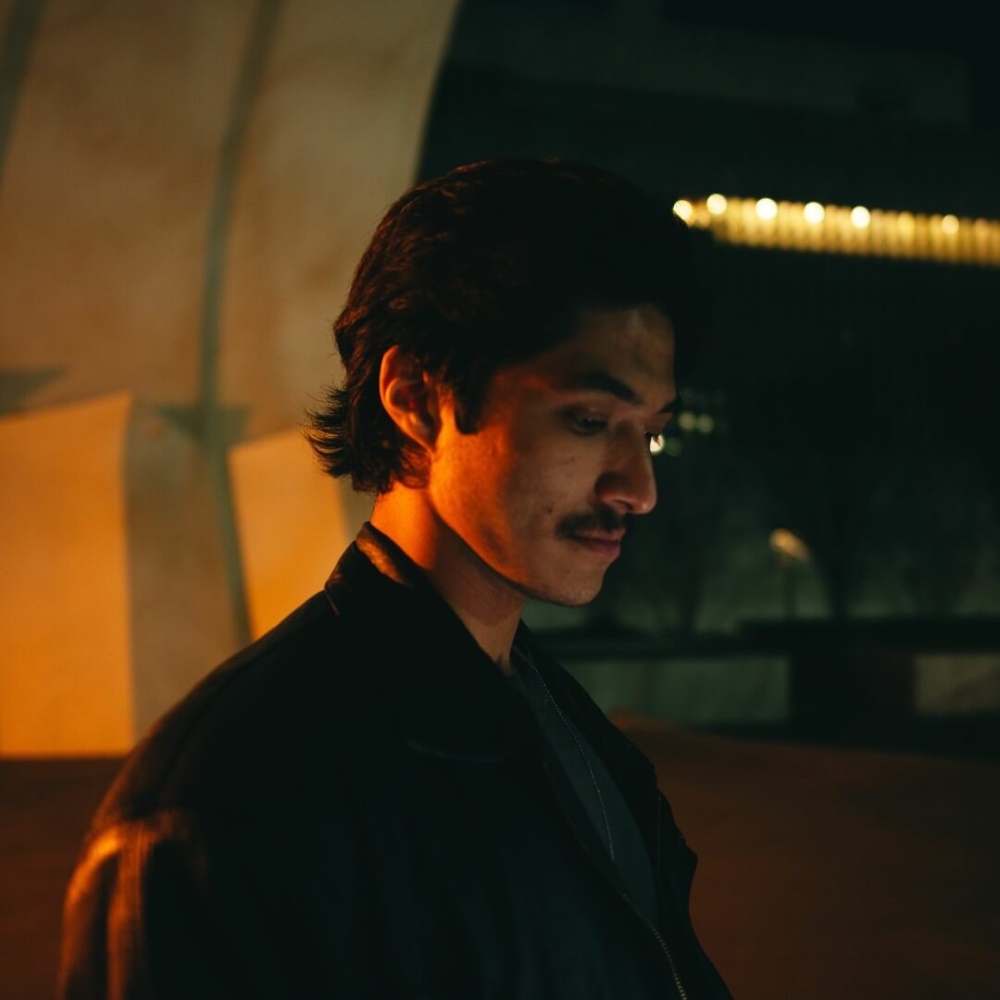Towards the start of 2025, we unveiled our picks for the most promising names in electronic music with our 20 Rising Artists spotlight series, anticipating their impact on the genre. One of the names, Kotiēr, is quickly proving why he is a star to watch with his string of impressive releases this year. The New York-based producer/DJ borrows from melodic house, Afro House, electronica, and melodic techno to craft a forward-thinking sound paired with immersive, futuristic visuals that he has created. This has led to releases on Solomun’s Diynamic, Tomorrowland’s CORE, and Adriatique’s Siamese imprints.
He continues his ascension with Static Soul EP - an eclectic body of work released via RÜFÜS DU SOL's Rose Avenue label filled with cinematic yet dance-friendly moments. Rich with emotional nuance, Static Soul dives into the paradoxes between recollection and transformation, where time and sound are equally limitless. In this interview, Kotiēr opens up about his come-up, the themes behind Static Soul, and his creative process.
What would you say were some of the signs in your childhood that you would end up making music?
I've been playing the piano for longer than I can even remember. My mom says I started when I was around three or four — that’s what she says, at least. Neither of my parents are musicians, but my dad has a deep love for it. He exposed me to everything he grew up with — rock, soul, reggae… He started taking me to concerts really early on.
But yeah, piano was always there. After school, I’d just come home and play for hours. I was always drawn to it — I don’t think I ever questioned why. It was just what I did.
Stay up to date.
New music and exclusive updates in your inbox weekly.
Where is the name Kotiēr derived from? And how is the name connected with the kind of listening experience you're wanting to create?
The name Kotiēr is a re-spelling of the French word for “coastal” — côtier or côtière. It’s a subtle nod to part of my heritage. One branch of my family was French and ended up in a French-speaking part of Cairo, where my dad was born. French was actually his first language growing up.
Beyond that, the word just felt right. It flowed off the tongue and captured something I’ve always been drawn to — the idea of flow states that still feel grounded. It might sound abstract, but that really reflects how I approach music. I love these flowing organic atmospheres and melodies, but at the same time, I care about groove, structure, and creating something that connects on the dance floor.
So Kotiēr became this anchor for a sound that’s fluid and melodic, yet rooted — like waves meeting the shore. That’s the kind of listening experience I want to create.
What kind of challenges - or maybe even advantages - came with pursuing a degree in computer science (and physics) while trying to make it as an artist?
The workload was definitely intense, especially early on, and it made it harder to find consistent time for music.
But CS taught me to think systematically, which helps when I’m breaking down creative projects, whether it's a track, a larger project, or a visual idea. It also made it easier to learn new tools or softwares.
Physics shaped the way I hear music — I think about sound very spatially. The way different elements interact in a mix feels similar to how I’d visualize problems in physics class. So while it was a challenge to balance both worlds, it definitely gave me a unique perspective.

Looking back, was there a defining moment when you and those around you sensed that your career was about to reach a new level?
I think it’s been more of a series of small moments than one big turning point. There were definitely a few moments that stood out, though. Hearing artists like Adriatique or Solomun play my music for the first time — that was surreal. Or playing in Tulum, where I visited a year before just as a fan in the crowd. But overall, it’s been a lot of gradual, quiet steps forward.
What was going on in your life during the creation of your latest project Static Soul EP, and how did this have an impact on your creative process?
Honestly, not much was going on — I was on vacation. I had my laptop with me, and without any pressure or expectations, I ended up just playing around. That’s often when the best ideas come.
I remember opening my laptop one morning and trying out a little arp idea, then switching things up with a breakbeat instead of the usual four-on-the-floor. A few hours later, "Lēthē" was basically done. Static Soul came together the same week — it started with that trippy vocal and some repetitive synth stabs. Both tracks came from a really free, low-pressure place.
Can you talk about the conceptual thread that runs through "Lethe" and "Static Soul" and ties them into the EP’s narrative?
With instrumental music, I often find that the meaning reveals itself after the fact. You tap into a feeling while creating, and only later do you realize what it was about.
For "Lēthē", it was this hypnotic, repetitive arp with subtle evolution — and when the chords finally come in at the end, it feels cleansing. I ended up naming it after the river Lethe in Greek mythology — the river of forgetfulness. If you drink from it, you lose your memory. To me, the track represents a kind of letting go — a release of the past, a dissociation from what’s been weighing you down.
"Static Soul" starts from a different place. It has this trippy vocal loop that fades in and out — “I’m feeling something in my soul” — and to me, that voice is like the inner push you hear when you’re stuck. Like when you're in a rut, and something inside you keeps whispering that you need to break out of it.
So the thread between the two is really about being stuck — whether in memory, patterns, or inertia — and the process of breaking free.
What was the hardest part about bringing these tracks to life?
To be honest, both tracks came together pretty quickly — "Lēthē" especially.
With "Static Soul", the biggest challenge was definitely the vocal. I took a single vocal sample and ran it through five or six different delay settings, then flattened them to audio and layered them all together. Controlling that chaos — while still letting it feel chaotic — was a bit of a balancing act. That was probably the trickiest part.
I'm sure this is the question everyone wants to know - but what is your process behind creating such intriguing visuals?
I remember seeing an interview with Virgil Abloh where he talked about how putting a piece of trash in a gallery turns it into art — not that music is trash, obviously — but the point stuck with me: the context you present something in completely shapes how it’s received.
I’m not always in the most beautiful places, so visuals became my way of building the environment I imagined the music living in. I film myself playing parts of the track, then layer multiple versions or replace parts of the scene with generative AI, found footage, or surreal textures. A lot of the compositing is done in the Adobe suite, but I use whatever tools feel new and interesting — MidJourney, Clang AI, TouchDesigner, or just diving into random internet archives. It turns into this kind of video collage — a way of giving the music a world to live in.
What's your relationship with social media at the moment? And what have you found to be a suitable approach for you to maintain a connection with your audience?
Social media can be unpredictable, but it’s still the best tool we have to stay connected. For me, it functions first as a kind of portfolio — a place where people can quickly get a sense of who I am and what I’m creating, both sonically and visually. It’s the first impression for a lot of people, so I want it to reflect the world I’m building.
Beyond that, I don’t really follow a strict strategy. I just try to put out work I’m proud of, and usually that finds its way to the right people. I recognize the people who comment and message me often — that kind of support means a lot. There’s no perfect system, but I try to stay consistent and honest with my work and my interactions.
What part of your craft do you feel you're currently struggling with and working to improve?
It’s always evolving. Visually, I’ve been thinking about how I can bring what I create at home into the live space — how to translate that world into something immersive for shows.
Musically, I’ve been trying to embrace more of the imperfections. Some of my earlier work — even if it was rougher — felt more emotionally expressive. As I’ve gotten better at producing and mixing, it’s easy to get caught up in chasing technical perfection and forget the original feeling behind it. I saw this quote recently — something like, you shouldn’t measure your art by how perfect it is, but by how expressive it is. That really stuck with me. I wouldn’t call it a major struggle, but it’s something I try to keep in mind: to let the emotion lead, and not polish the life out of it.
Okay so, 1) an artist/band you’d love to go on tour with 2) an artist/band you’d love to have a D.M.C (deep meaningful conversation) with 3) An artist you would love to be your mentor. You’re welcome to select from artists who are dead/retired.
I think it would be amazing to tour with someone like Sasha, Hernán Cattáneo, or Carl Cox during the late ’90s and early 2000s. Not necessarily to perform with them — just to witness that era of house music as it was really taking shape. Experiencing those moments firsthand would be incredible.
For a deep, meaningful conversation, maybe someone like Marvin Gaye. I mentioned earlier that my dad exposed me to a lot of soul music growing up, and Marvin Gaye was a big part of that. I used to play some of his songs on piano, and I still listen to his music a lot. I don’t know exactly what I’d ask him — I think I’d just want to hear how he approached making music back then. It’s hard to explain, but just sitting with someone like that… It would be powerful.
For mentorship, Bonobo comes to mind. He has an incredible body of work spanning 25 years — album after album, each with its own world. His music strikes this beautiful balance between electronic production and organic instrumentation. I love how he moves fluidly between DJ sets and these full live performances with orchestration. I just deeply respect what he creates. I think I could learn a lot from him.







